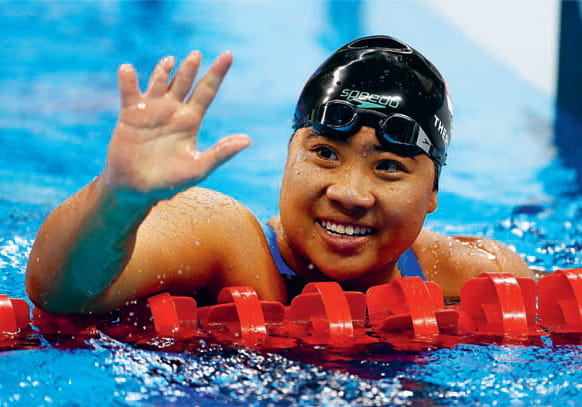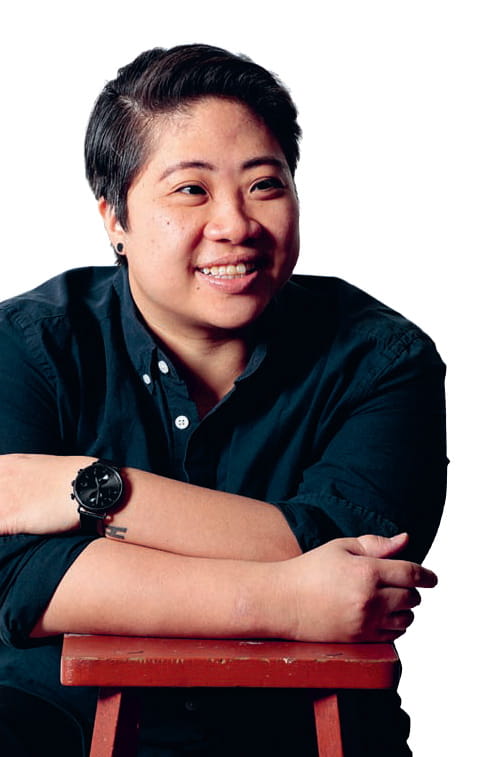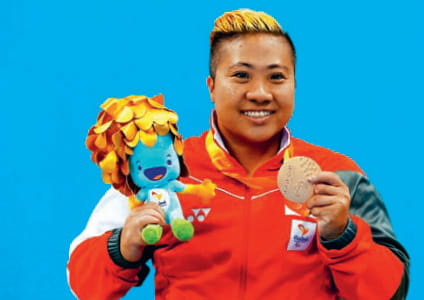Stories > Changing Currents
Changing Currents
Paralympic medallist Theresa Goh, who retired after a two-decade-long swimming career, examines inclusivity in Singapore’s sports scene and society at large.
BY THERESA GOH
PHOTOS MARCUS MOK; SPORT SINGAPORE
wimming is the one thing that allows me to feel free and uninhibited. In the water, where I can hold my breath at the bottom of the pool, it feels like there are no barriers – unlike on land, where I may have to ask for help in certain places.
I have been swimming since the age of five and doing so competitively since 12. Disability sports in Singapore has come a long way since then. In the past, the Singapore Disability Sports Council (SDSC) was relatively unknown. The programme I was in was run by volunteer coaches and lacked funding. Today, thanks in part to our success, our national team has full-time coaches and receives more financial support from the government. With SDSC now considered a National Sports Association, the national sports governing body Sport Singapore (SportSG) now pays both disabled and able-bodied national athletes to train full-time, under the Sports Excellence Scholarship programme. It also helps that our athletes have access to world-class facilities at the Sports Hub.
CHAMPIONING INCLUSIVITY
Clearly, there has been a positive mindset change towards disabled sports in Singapore. In the past, there was a disparity in the way that disabled and able-bodied athletes were viewed, and as a para-athlete, I’ve often struggled with not being taken seriously. There are some who do not see us as whole people who deserve equal treatment. Up until recently, for instance, we were given separate send-off ceremonies for participating at various international and regional events, like the Olympics and SEA Games. I am happy to say this has changed. It feels that we are finally part of the team, as opposed to being an afterthought.
I am also happy to note that the achievements of disabled athletes are now covered in the sports section of our papers instead of the home section, where we were previously featured. While I cannot pinpoint the exact moment that attitudes shifted, these changes have been encouraging.

Theresa Goh has won numerous prizes in competitive swimming, such as at the Asean ParaGames and the 2016 Summer Paralympics in Rio de Janeiro.
DOLLARS AND SENSE
But is enough being done to help disabled athletes? While I do not have a clear answer to that question, any discussion inevitably raises the issue of prize money. Singaporean Paralympians are awarded S$200,000 for winning a gold medal at the Paralympics – under the Singapore National Paralympic Council’s Athlete’s Achievement Award Programme – while our able-bodied counterparts receive S$1 million for the same achievement. While money is not the be all and end all, the difference in cash rewards constitutes part of a larger conversation on equality.
Given that some competitions in the Paralympics draw less athletes than the corresponding event in the Olympics, some may argue that the former is less competitive and that disabled athletes do not, therefore, deserve the same monetary rewards as our able-bodied counterparts. But a counterpoint can be made that the participation levels in major tournaments vary across all sports, whether for the able-bodied or disabled.
I do not think raising monetary rewards for Paralympic athletes is necessarily the solution, as doing so may attract the wrong kind of sportsman who is only seeking short-term benefits.
“Up Until Recently, We Were Given Separate Send-off Ceremonies For Participating In Various International And Regional Events, Like The Olympics And Sea Games. I Am Happy To Say That This Has Changed. It Feels That We Are Finally Part Of The Team, As Opposed To Being An Afterthought.”
That said, the thinking behind how a disabled athlete is rewarded for winning medals inevitably boils down to what our achievements are deemed to be worth. Changing mindsets is fundamental to attaining greater equality. We must continue to educate others about our field of work – from those working behind the scenes to influence policy, and the more vocal advocates fronting these issues, to the para-athletes striving to elevate their sport.

Goh says that a truly inclusive society is one which consults disabled people while planning its its infrastructure.
OVERCOMING OBSTACLES
Personally, I’ve grown to embrace my role as the face of disability sports in Singapore. Being recognised by the general public means greater visibility, and I hope to correct the common perception that people in wheelchairs are helpless. For instance, the idea that we can’t function independently when out alone reflects a lack of depth in the general understanding of the disabled. This can be changed with greater representation of disabled people in the media and wider public discourse on inclusivity.
For me, an inclusive society is one where I do not have to worry about day-to-day living. When visiting an unfamiliar place, for instance, I have to make it a point to find out if there are steps or curbs that I cannot handle. Then there’s the issue of wheelchair-bound individuals being disallowed from riding escalators at MRT stations. It is certainly frustrating to have to alight at a different station and take a detour to my destination when the lift at my intended station is under maintenance. All I need in such an instance is just someone to stand behind me while I take the escalator. While I understand that the MRT staff is just following protocol, a little flexibility can go a long way. A truly inclusive society may not come easy, but for a start I would suggest involving people with disabilities in discussions when building infrastructure.
INTERNATIONAL SENSIBILITY
Having retired from competitive swimming, I look back at a career representing Singapore on the world stage. National pride aside, I must admit that there’s a certain level of self-interest associated with being a sportsperson. While bearing your country’s flag on your back entails responsibility, you are also doing it to build yourself up. Learning to overcome my setbacks in competitive swimming, which include missing the bronze medal at the 2008 Beijing Paralympics, have strengthened me as a person.
Over the years, I have met athletes and sports professionals from all around the world. Though my interactions with competitors have been brief, my experiences have been eye-opening. At an organisational level, I was impressed by the amazing publicity given to the para-athletes during the London Paralympics, which was highly visible yet respectfully rendered. Athletes were shown as powerhouses in their own rights, as opposed to an angle that appeared to portray us as inspirational figures but that focused overwhelmingly on our disabilities.

The swimmer won a bronze medal at the 2016 Paralympic Games in Rio.
Indeed, it is difficult to grasp the difference between representation and glorification. To this end, I would recommend practising a little sensitivity and questioning whether certain narratives would be appropriate when applied to the able-bodied. For instance, if portraying an able-bodied athlete as a “superhero” is considered over the top, then using the same term for disabled athletes may not be such a good idea.
On a personal level, meeting athletes from around the world has given me a greater appreciation of their cultures. Observing Japanese athletes bow to their coaches and one another after each training session has given me an appreciation for their mutual respect, as well as their reverence for their elders and authority figures. I’ve also learnt, through training sessions with the New Zealanders that they are not only friendly but willing to share their skills.
Many of my international counterparts have not had the opportunity to visit Singapore and learn about our way of life. I hope that more collaboration between Singapore and the international sporting community can take place in the future. After all, such exchanges are crucial not only to growing the sport but also to promoting friendship among athletes as well as countries.
“Meeting Athletes From Around The World Has Given Me A Greater Appreciation Of Their Cultures. I Hope That More Collaboration Between Singapore And The International Sporting Community Can Take Place In The Future.”
Theresa Goh, Paralympic Swimmer
In the next 10 years, I envision continued growth in Singapore’s disability sports scene. With SportSG’s plans to ramp up efforts to promote sports at special education schools and disability centres, we will see more paraathletes in the country. There are also new programmes that provide financial support to disabled athletes of different levels. Not every disabled athlete can compete professionally, but with the right focus and support, they can continue to thrive in their chosen sport.
ABOUT THE AUTHOR
Theresa Goh is a Paralympic swimmer and an advocate for disability sports. She was born with congenital spina bifida that limits her physical mobility without a wheelchair. After becoming Singapore’s first local Paralympic swimmer to represent Singapore in the 2004 Paralympics in Athens, she has gone on to represent the nation at numerous international championships for para-athletes. She won a bronze at the 2016 Summer Paralympics in Rio de Janeiro; gold at the 2006 World Para Swimming Championships in Durban, South Africa; and more than 30 gold at the Asean ParaGames since 2001. She was conferred the Pingat Bakti Masyarakat, Singapore’s Public Service Medal awarded for individual contribution to the nation. She retired from competitive swimming in 2019.
